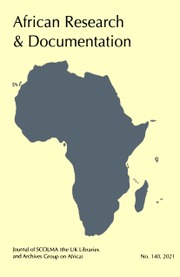No CrossRef data available.
Article contents
Publishing in Kiswahili and Indigenous Languages for Enhanced Adult Literacy in Kenya
Published online by Cambridge University Press: 25 April 2022
Extract
This paper argues a case for the preparation of reading materials in Kiswahili and other African languages in order to enhance adult education in Kenya. Adult education clientele are defined as those aged over 15 who (a) were either never enrolled in primary schools or dropped out before completing and (b) ‘graduated’ and currently participate in community extension services. Cognisance of mother tongues as the best languages to begin basic literacy is taken. However, since the literacy so acquired should be useful to the individual at both local and national levels, one needs Kiswahili for wider communication. Therefore, reading materials, especially for post literacy and adult literacy teacher training should be in Kiswahili. This will not only guard against relapsing to illiteracy and misinformation but will also alleviate the scarcity of reading materials in the face of hard economic times in Kenya.
- Type
- Articles
- Information
- Copyright
- Copyright © International African Institute 2002
Footnotes
Text of a paper originally presented at the Kiswahili Colloquium organised by University of Bayreuth, 25-29 May 2001




